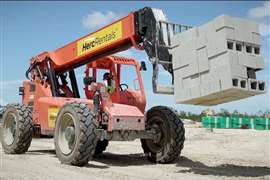Q1 RentalTracker shows improved confidence in Europe
07 April 2010
The ERA/IRN RentalTracker survey for the first three months of 2010 shows a continuation of the positive trend in business confidence revealed in previous surveys, with more positive views on current business conditions and improving utilisation.
For the first time since the start of the Tracker (Q2 in 2009) there is a positive balance of opinion on current business conditions, with 26% saying that conditions were improving and 24% reporting a deterioration (and 51% seeing no change). It is a small change but welcome nevertheless.
Likewise, the trend is up on time utilisation, with a positive balance of opinion of +12% (26% say the trend is upwards, 40% are neutral, and 24% say utilisation is falling). This compares to a negative balance of opinion of -5.3% in the final quarter of 2009.
However, the severity of the downturn in certain markets is illustrated by the fact that business levels in the first quarter of this year were overwhelmingly judged to be worse than the first quarter of 2009. Some 25% of respondents thought the first quarter this year was better than Q1 2009, while 51% said business levels were worse - a negative balance of -26%.
Despite a difficult first quarter of 2010, rental businesses in Europe are clearly hopeful that the worst of the downturn is over, with a +11% balance of opinion on expected business levels for the full year compared to 2009 (39% said they expected a higher level of business in 2010, 33% said it would be the same as 2009, and 28% expect it to be lower).
The continuing uncertainty about business conditions is reflected in the results for capital investment, with a reversal of the positive trend established in the previous quarter.
At the end of 2009 there was a +10.1% balance of opinion on whether companies would invest more or less in 2010 than in 2009 (that is, there were more companies planning to increase spending than planning to cut spending).
However, at the end of March, Europe's rental companies were being much more cautious, with a big switch to a negative balance of opinion of -21% (24% say they will spend more in 2010, 32% say they will spend the same, and 45% report that they will invest less.)
Geographically in Europe there are no major differences between countries or regions. Where there is sufficient data to make results meaningful (UK/Ireland, Benelux, Nordic region, Spain, Italy, France), opinion was noticeably more negative in Spain (where conditions are reported to be deteriorating) and also in Italy, were there was a negative -22% balance of opinion on current business conditions.
In sector terms, powered access renters appear to be experiencing more negative conditions than their counterparts in general rentals, with a negative balance of opinion (-10%) on current business conditions and a negative balance also (-20%) on plans for investment this year (40% will spend less in 2010 compared to 2009, while 20% plan to invest more).
General rental companies had a positive +17% view on current business conditions (39% said conditions were improving; 39% said there was no change; and 22% said they were deteriorating). As with powered access renters, general rental companies are being cautious on fleet investment, with a negative balance of opinion of -10% (30% will spend more, 40% will spend less).
The survey was undertaken in the final two weeks of March and over 135 companies in Europe responded.
The full results, and graphical charts, will be available online in the coming weeks. See also www.khl.com/rentaltracker for details.






